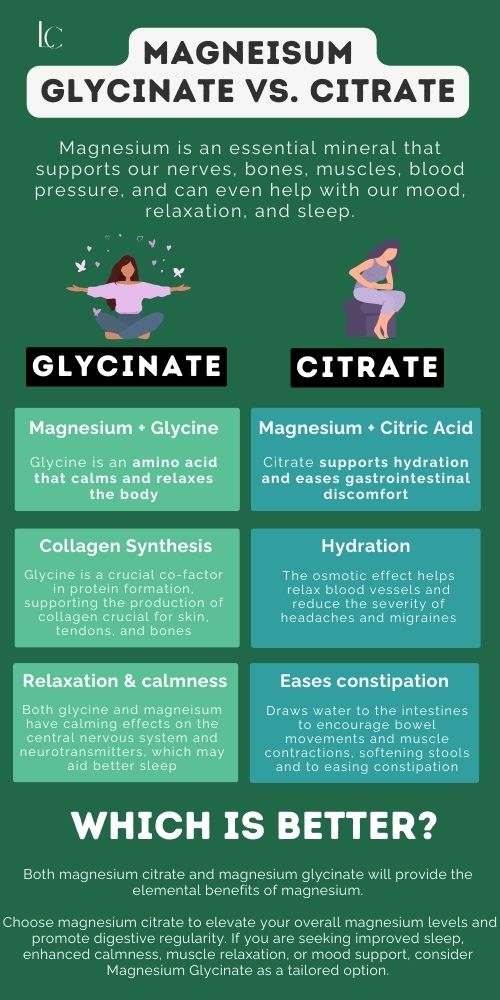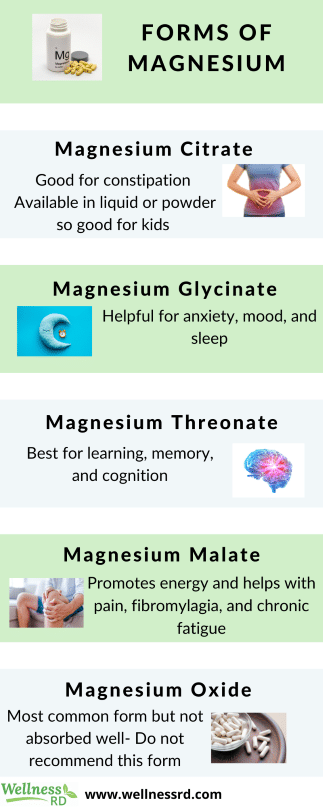Have you ever stood in the supplement aisle, faced with countless bottles, and wondered whether magnesium citrate or magnesium glycinate would be better for you? It’s a common query, and you’re certainly not alone in pondering the differences between these two forms of magnesium. Magnesium is an essential mineral that your body needs for various functions, from muscle health to nerve function, and even for maintaining a steady heart rhythm. Both magnesium citrate and magnesium glycinate offer unique benefits, so let’s unpack their nuances together.
Understanding Magnesium: Why It Matters
Magnesium is a powerhouse mineral involved in over 300 enzymatic reactions in your body. It plays a crucial role in processes that are vital for your health, including protein synthesis, muscle and nerve function, blood glucose control, and blood pressure regulation. It’s also needed for the production of energy, the synthesis of DNA, and the development of bones.
The Importance of Magnesium in Diet
Your diet might sometimes be lacking in magnesium, especially if you’re consuming a lot of processed foods. Foods like nuts, seeds, whole grains, and leafy greens are rich in magnesium, but not everyone regularly eats these foods. A deficiency in magnesium may lead to symptoms like fatigue, muscle cramps, mental disorders, osteoporosis, and high blood pressure. Hence, getting enough magnesium is crucial for sustaining your health.
Magnesium Citrate: What You Need to Know
Magnesium citrate is the magnesium salt of citric acid and is commonly regarded as acidic in nature. It’s known for its good bioavailability, meaning your body can efficiently absorb and utilize it. People often take magnesium citrate as a laxative or to relieve constipation because the citrate salts act as osmotic laxatives.
Benefits of Magnesium Citrate
- Enhanced Absorption: Thanks to its acidic property, magnesium citrate is absorbed better in the intestines compared to some other forms.
- Digestive Aid: Its mild laxative effect can help those who suffer from occasional constipation.
- Bone Health: With calcium, magnesium can support proper bone formation and might reduce the risk of osteoporosis by improving bone density.
Possible Side Effects of Magnesium Citrate
While useful, excessive intake of magnesium citrate can lead to several side effects. The most notable include gastrointestinal issues like diarrhea, abdominal cramping, and sometimes nausea. It’s important to follow dosage instructions or consult a healthcare professional to avoid these issues.

Magnesium Glycinate: Digging Deeper
Magnesium glycinate consists of magnesium bound to glycine, an amino acid. This form is often favored by those who need a supplement that is gentle on the stomach. It’s especially beneficial if you’re looking for a magnesium supplement without the laxative effect.
Benefits of Magnesium Glycinate
- Soothes Anxiety and Insomnia: The glycine component may have calming effects, aiding in anxiety reduction and sleep improvement.
- Promotes Heart Health: By helping to maintain a steady heart rhythm, it promotes cardiovascular wellness.
- Reduces Muscle Pain: Magnesium glycinate is known to help with muscle relaxation, reducing spasms and pain.
Possible Side Effects of Magnesium Glycinate
Though generally safe, some people might experience mild side effects such as stomach upset or diarrhea if taken in very high doses. It’s best to start with the recommended dosage and adjust only under medical supervision.
Key Differences Between Magnesium Citrate and Magnesium Glycinate
To decide which form suits you best, consider the key differences in their purposes, benefits, and side effects.
| Aspect | Magnesium Citrate | Magnesium Glycinate |
|---|---|---|
| Absorption | High bioavailability but may cause loose stools | High bioavailability, gentler on the stomach |
| Common Uses | Laxative, digestive aid, general supplementation | Reducing anxiety, muscle pain, improving sleep |
| Side Effects | Possible diarrhea, abdominal discomfort | Mild stomach upset at very high doses |
| Additional Benefits | Improves bone health | Aids heart health, reduces insomnia |

Which Should You Choose?
Determining the right magnesium supplement for you might depend on your specific health needs. Are you looking for something to help with digestion and bowel movements? Magnesium citrate might be your best bet. Alternatively, if you want a supplement to help with anxiety, sleep disturbances, or muscle cramps, magnesium glycinate may be the more appropriate choice.
Factors to Consider
- Health Goals: Identify what you’re hoping to achieve with supplementation—whether it’s digestive health or improved sleep quality.
- Current Health Conditions: Consider if you have health conditions like irritable bowel syndrome which might be influenced by the laxative effect of magnesium citrate.
- Dosage and Timing: Speak with a healthcare provider about the best dosage and times to take your supplement based on your personal health needs.
How to Incorporate Magnesium into Your Routine
Once you’ve made your choice, incorporating magnesium into your routine is straightforward. You can pick a convenient form such as a capsule, powder, or liquid, and follow the dosage recommended by the packaging or your healthcare provider.
Tips for Best Absorption
- With Food: Taking magnesium with meals might reduce the potential for stomach upset.
- Hydration: Keep hydrated, especially if you’re using magnesium citrate due to its diuretic properties.
- Consistency Is Key: Regular daily intake helps maintain steady magnesium levels in your body.

Possible Interactions and Precautions
Certain medications and conditions can affect how magnesium is absorbed and utilized in your body. Medications such as certain antibiotics, muscle relaxants, and medications for osteoporosis may interact with magnesium supplements.
Who Should Be Cautious?
- Kidney Issues: If you have kidney problems, you should be cautious with magnesium supplements, as your kidneys regulate magnesium in the body.
- Pregnancy and Breastfeeding: Consult with a healthcare professional if you’re pregnant or breastfeeding before starting any new supplements.
- Medication Concerns: Always check with your doctor or pharmacist to rule out any potential interactions with your current medications.
Conclusion: Balancing Your Needs and Preferences
Ultimately, the choice between magnesium citrate and magnesium glycinate comes down to your individual health goals and how your body responds to each form. There’s no one-size-fits-all answer, but by considering your health needs and consulting with a healthcare professional, you can make an informed choice that benefits your well-being. Whether you’re aiming to tackle digestive issues or looking to find a little peace in your day-to-day life, the right form of magnesium can make all the difference.
